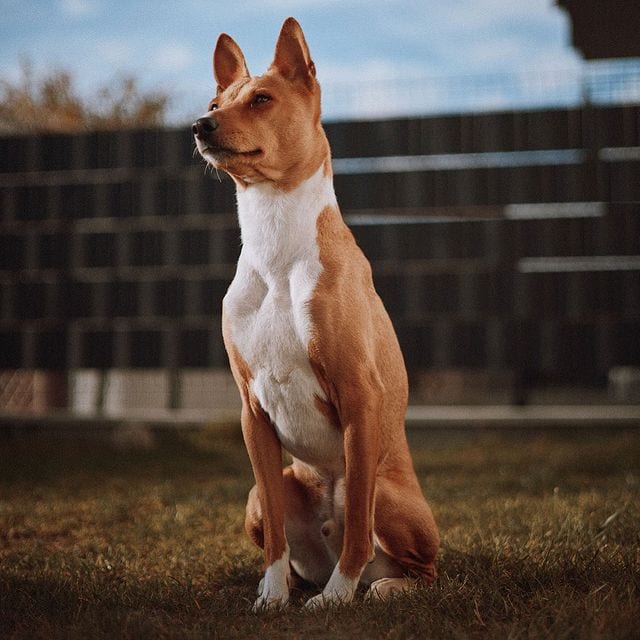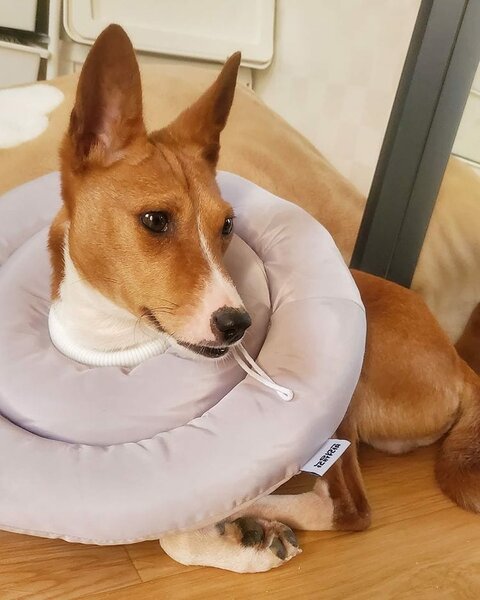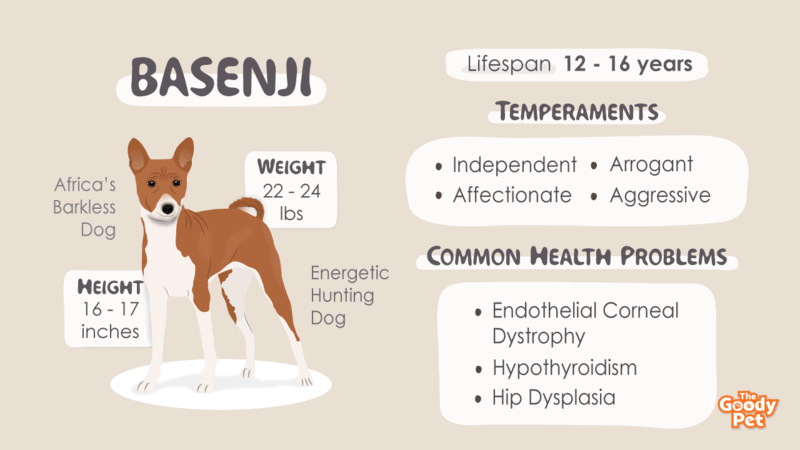You may have asked yourself a few times how African hunters used to cope with hunting in the past. The answer to that question is what I will be talking about. Generally, hunting for game is a lot of work for hunters, and they often need a companion that is swift and agile. No wonder you would always find them with the Basenji dogs.
Known as Africa’s Barkless Dog, the Basenji is a breed of curious and energetic hunting dog indigenous to Central Africa. It is arguably one of the world’s oldest dog breeds. Although they are not known to bark, Basenjis are not entirely quiet. They can be very vocal and make yodel-like sounds.
You might be wondering if Basenjis are good guard dogs and how long they can live. You may also be concerned about taking care of them. Not to worry, In this article, I am going to share with you everything you need to know about Basenji – Africa’s barkless dog. But before that, let’s talk about how big Basenjis can get.
How Big Do Basenjis Get?

Generally, Basenjis have an average height of 17 inches for males and 16 inches for females. Speaking about their weight, the male Basenjis typically weigh about 24 lbs, while their female counterparts weigh about 22 lbs.
As a dog owner, it is important to know how big your Basenji can get because it is an essential consideration when making diet plans and exercise needs for your Basenji. Here are some other important things you need to know about your Basenji.
Physical Appearances Of Basenji Dogs
Basenjis have lean and compact bodies, short hairs, almond-shaped eyes, and their ears are always erect. Their body grows evenly with increasing heights. This makes them more agile than other dogs.
Coat Colors And Patterns Of Basenjis
Basenjis come in different colors, which include:
Red And White
This is the common color that comes to people’s minds whenever they think of Basenjis. The red color is in different shades, with the majority being a vibrant and saturated red that is otherwise referred to as orange.
Black And White
This is usually a bright and clear white with a dark black combination. Most Basenjis have their feet covered with white color while the body is black.
Tricolor
Tricolored Basenjis come in three colors – a dominant black color and a mix of red and white. The red usually spreads to different parts of the body, including the upper legs, ears, and cheeks.
Other colors are blue and cream colors, though very rare. They also have brindle and trindle color patterns.
Are Basenjis Rare?
Basenjis originate from the African continent. The dogs were originally found in Congo before spreading to other parts of the world. Although Basenjis have become increasingly popular, they are not very rampant as other African dog breeds.
How Long Do Basenjis Live?

On average, Basenjis can live up to 12 to 16 years.
As independent dogs, their ability to survive harsh conditions also accounts for their longer life span. As much as they can survive difficult conditions, they are also affected by common health issues, which will be explored next.
Dental Diseases
This is one of the most predominant diseases in dogs, and your pooch is not an exception. Dental diseases, if not treated, can result in tooth decay and the loss of teeth, which can cause damage to the liver and kidney of your four-legged friend. This directly affects the lifespan of your dog and can cut it short by 1 to 3 years.
Endothelial Corneal Dystrophy
Endothelial corneal dystrophy is a condition where fluid accumulates within the cornea of your pooch’s eye. Though a rare condition, it can be severe in Basenji puppies.
Hypothyroidism
This occurs when the thyroid gland, tasked with producing hormones, like Thyroxine (T4) and Triiodothyronine (T3), is not functioning properly. This health condition is noticed in Basenjis, and symptoms include weight gain, poor coat, and a decreased activity level.
Other Notable Health Conditions
Other conditions affecting Basenjis include patellar luxation, progressive retinal atrophy, immunoproliferative enteropathy, Fanconi syndrome, and hip dysplasia. If you observe that your canine has symptoms of any of these diseases, then you need to see a veterinary doctor for proper medical care.
How To Take Care Of Your Basenji?
Basenjis are perfect companions for their owners. As adorable as they can be, they also have their special needs. This means that if you own one of them, you need to know how to take care of your doggo. Let’s talk about exercise routines for your doggy.
Exercise Routines For Basenjis
When it comes to exercise and training, Basenjis need a lot of it to keep them active. As energetic as they are, regular exercises are a must for this breed.
Basenjis need to constantly let out their energy by engaging in physical exercises such as tracking, racing, obedience, and agility activities. You should take your dog out for a walk for at least 30 minutes daily.
High-Quality Diets For Basenjis
Basenjis require a mix of wet and dry food to create a balance in their diets. You should consider planning diets according to their age, needs, and size. A good diet should contain meat, vegetables, and grains. Pet Plate has great recipes that are good for Basenjis.
Basenjis require 1 to 2 cups of food daily to maintain good health. These breeds are naturally lean with small body sizes, and overfeeding them might lead to an increased size which can cause health complications.
You should watch your dog’s weight and proportion the food according to their needs. If your Basenji is growing bigger, then it’s time to start exercising.
Taking care of your Basenji includes making sure to eliminate all possibilities of bad breath. The use of dental water additives is a perfect solution for your Basenji’s oral health. It helps your doggy to maintain healthy teeth and gums.
More importantly, it is very convenient. Simply add a few drops into the dog bowl for drinking water, and you are all set for the day.
Are Basenji Good Guard Dogs? Temperaments Of Basenjis
Basenjis are not recommended as guard dogs. Though they are courageous enough to fight and defend you when someone approaches your property, they are not considered good guard dogs due to their inability to bark and their small physical size.
Basenjis are willful and independent breeds that are usually very stubborn. Though reserved most of the time, they can be aggressive and arrogant to strangers. On the good part, they are very affectionate dogs and are not always aggressive unless you excite them.
Basenjis become temperamental and destructive when they are confined to a particular place. They are not the kind of dog you can control with commands. They are strong-willed and will always decide whether to listen to you or not.
Are Basenjis Barkless?
Yes, Basenjis are barkless and are unable to bark because of their unusually shaped larynx. Thus, this feature make them the best companion for hunters because they can always hunt and takedown a game without a sound.
However, being barkless does not mean they are entirely quiet. In fact, Basenjis make a lot of noise, and this is another way to recognize them. You can always find them yodeling and whining all the time.
Why Do Basenji Dogs Yodel?
Basenjis have a larynx or voice box, which is shaped in an unusual way that makes them yodel and does not allow them to bark like other dogs.
Do Basenji Dogs Shed? Grooming Tips For Basenjis
Basenjis have lean body builds with short furs that do not shed easily. In fact, the nature of their fur does not allow them to shed as much as other dogs.
Basenjis are also natural groomers. Just like cats, they do not like to be messed up. This means your doggy will always groom itself most of the time.
Is The Basenji Hypoallergenic?
Yes! As they shed neither easily nor a lot, the Basenjis are considered to be hypoallergenic.
However, during winter and autumn, you will most likely find your Basenji shedding more fur than normal. This means you need to groom and brush your dog frequently with the FURminator Undercoat Tool to keep your home free of dog hairs.
This tool is designed with comfortable handles that will make the grooming process faster. It also has a mechanism that releases the fur easily.
Can You Bathe A Basenji?
Yes! Basenjis need baths when necessary.
Although they do not need regular baths due to their self-grooming ability, bathing them at least once a month is ideal for keeping them clean and tidy. Before bathing your Basenji, ensure to brush your pooch’s coat, apply eye ointment for eye protection.
Also, avoid soapy water inside the ears and use the Pro Pet Works All Natural 5 In 1 Oatmeal Shampoo with warm water for the bath. This shampoo has dog-friendly formulations that protect your pooch’s skin and fur.
Related Questions
How Much Do Basenji Puppies Cost? A Basenji puppy costs around $500 to $800. Basenjis have different price ranges depending on their sizes. Getting a Basenji puppy will require patience on your end because they are considerably rare breeds, and puppies are born only once a year. Grown Basenjis cost between $1,500 to $2,100.
Do Basenjis Like Swimming? No, Basenjis don’t like swimming. These breeds are very reserved and do not like to get wet at all. In fact, Basenjis avoid water all the time. They always want to keep themselves dry and clean at all times.
Do Basenjis Make Good Pets? Yes, Basenjis are good companion dogs that are always very protective of their families. They love to be vigilant and reserved, and their quietness makes them well-suited as apartment dogs. Overall, Basenjis are very affectionate. Though they are no longer used as hunting dogs, they are one of the best breeds you should own as a dog lover.





